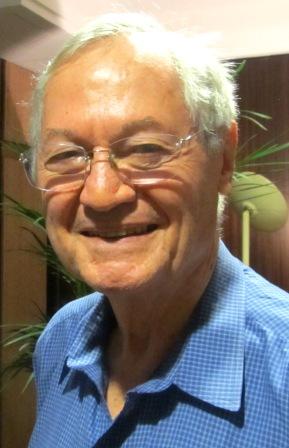Roger Corman is a mythic hero in the movie business. Not only did he direct over 50 films, produce more than 300, distribute the major European auteurs (Bergman, Fellini, etc) to the American public, but he is personally responsible for launching the careers of Jack Nicholson, Francis Ford Coppola, Ron Howard, and many others.
Yesterday his generosity continued: at age 85, he gave a Master Class to young would-be American filmmakers on how to be a success.
A first question was how to deal with failure.
"I don't know," Corman quipped. " I never had a failure. All my films were successes. Any low-budget studio would accept any idea I ever had." Indeed, Corman's opus---mostly B movies on extremely low-budget---were famed for their lucrative results.
All except one, he noted: a conscientious film about racial integration, which earned him death and arrest threats, when finally finished. "One of the New York papers said this film was a credit to the entire movie industry-- and the first film of mine that ever lost money."
A new (very entertaining) documentary on Corman, Alex Stapleton's "Corman's World: Exploits of a Hollywood Rebel", tells us, through interviews with Nicholson, DeNiro, Scorsese et al, how Corman achieved his success: through resourcefulness and creativity.
But Corman in person emphasized a third necessary component: preparedness.
"The best advice I can give you, " Corman shared with his young audience. "Do the most preparation you can. Don't turn to the crew and say where I can put the camera? I told Ron Howard: preparation! I still remember the first day of a shoot, Ron told me that the mother of Happy Days will now come in and pick up the telephone. 'We will now pan and dolly in, and shoot,' he said. And that is exactly what happened.. He was working efficiently so no time was wasted. He knew what he was doing. He had done his homework."
Similar advice would apply to writers, Corman added. Preparation is key, he said, giving the example of young Francis Ford Coppola working on his scripts.
"I like the way Francis Coppola works as a writer. He gets ideas for characters and scenes, he has little note-cards. He would write an idea on a note-card and paste it on the wall. He would have his room covered with these cards, describing all these scenes, characters, plot lines. This is the preparation for a writer. He would go through many drafts as well."
It also pays not only to be prepared, but to be prepared for change. With an affable grin, very composed, the 85 year old Corman told us an amusing anecdote--laughing himself--about how he was shooting a scene (in Little Shop of Horrors) with Jack Nicholson that took place in a dentist's office, and, in a filmed scuffle, the chair collapsed. "How long will it take to fix that dentist chair?" Corman had asked. Two hours. So he changed the scene, and had it end with the chair collapsed on the ground.
But the most important advice for would-be directors: just jump in. "Get that experience as fast as you can and don't wait. Go right in."
Corman himself went from an engineering background to throwing himself head-first in the film industry, gaining fame immediately as the man who intrepidly makes films at any cost, and fast.
In the process, he attracted incredible talent to himself---Coppola, Nicholson, Cameron--and launched their careers as well.
For example, speaking about The Terror, he noted that the picture never would have been made except that it rained on a Sunday. He had been finishing up "The Raven", due that Friday, and called up a friend, and told him he had a good idea.
"I told him, look I have good sets of The Raven, and we can shoot for two days on these sets, and so Leo and I worked up a storyline and shot it in two days, with Jack Nicholson and Boris Karloff. I told Jack Nicholson, you will emerge as a star. My assistant at the time, Francis Coppola shot it. Then Monte Hellman came in and directed part of it. Then we had one more day, and Jack Nicholson said: "Every idiot in town has directed part of the picture, can I direct the last day?"
Corman laughed speaking about this haphazardly-made flick. "Nobody has ever been able to figure out the plot of The Terror."
He also identified Jim Cameron as a man with enormous talent. Cameron was a model-maker on his science fiction flick: "Battle Beyond the Stars." Soon he was promoted to director of special effects, second unit director, director. "This is a classic case of a person with a great deal of talent," Cameron mused. "Who gets promoted from film to film. I was able to assess their ability, and had them gradually move up the ladder."
Evidently a sharp businessman, Corman also knew the importance of distribution (observing that today it may be easier to technologically make a film, but it is more difficult to get distribution--except with the new opportunities on the internet.)
And so Corman became a distributor himself: indeed, the major distributor for European art films. "I had been an independent writer/producer for many years, and in 1970 I began my new distribution and production company, New World, and every picture was a success. I had always admired the work of the auteurs, Bergman, Kurosawa, Truffaut, Fellini etc, and I thought if I could bring these men's work to a greater audience, and could break even or even make a little money, I would be happy. Our films won more awards for best foreign picture than all companies combined."
Now Corman---despite this avalanche of constant success in every domain of film-making--must have, at least once or twice in his life, come upon some obstacles, no?
"Sure. But whenever I found myself in hard times, I analyzed how these hard times were happening and what could be done about it."

